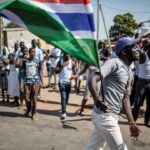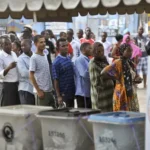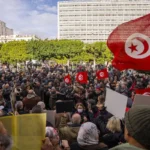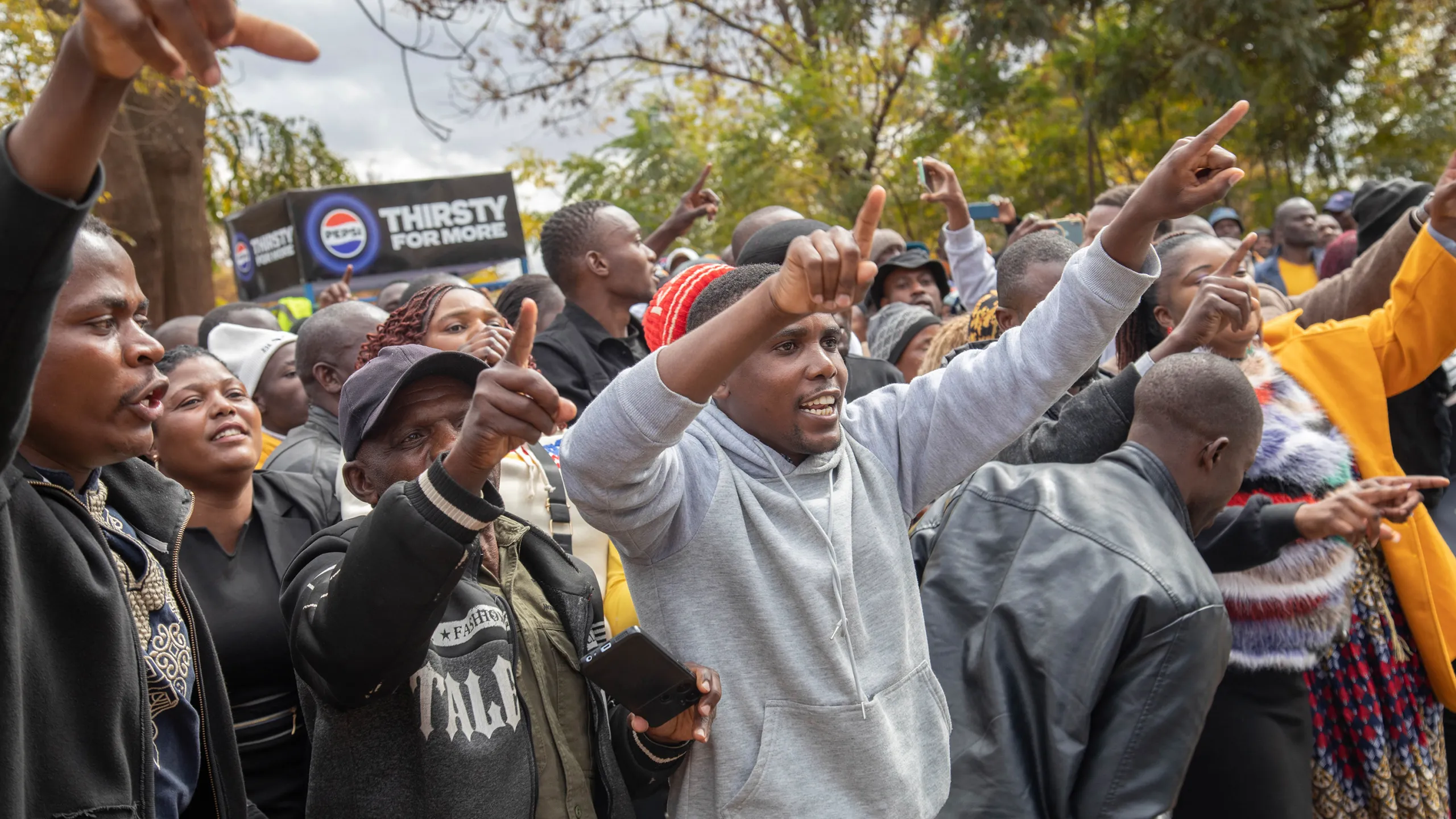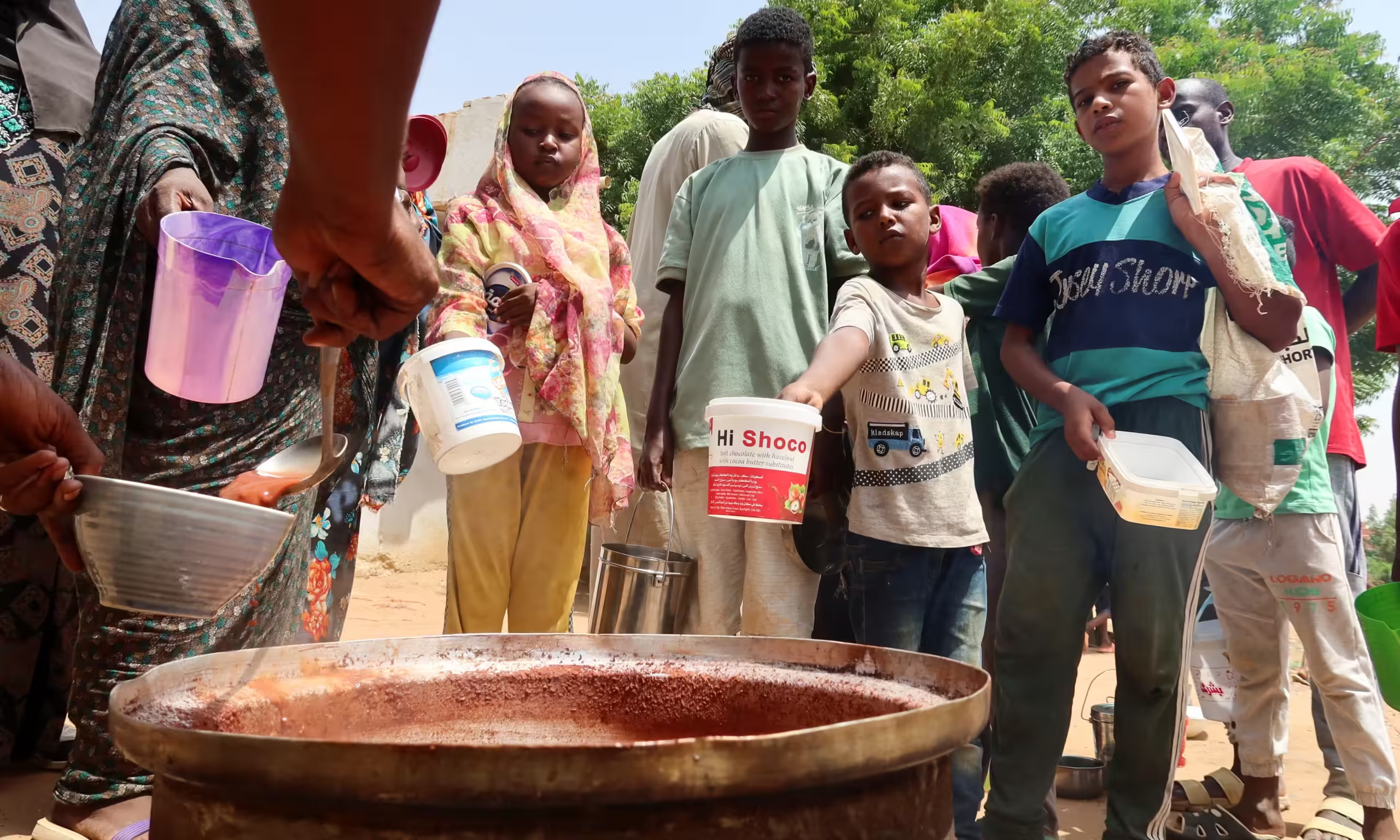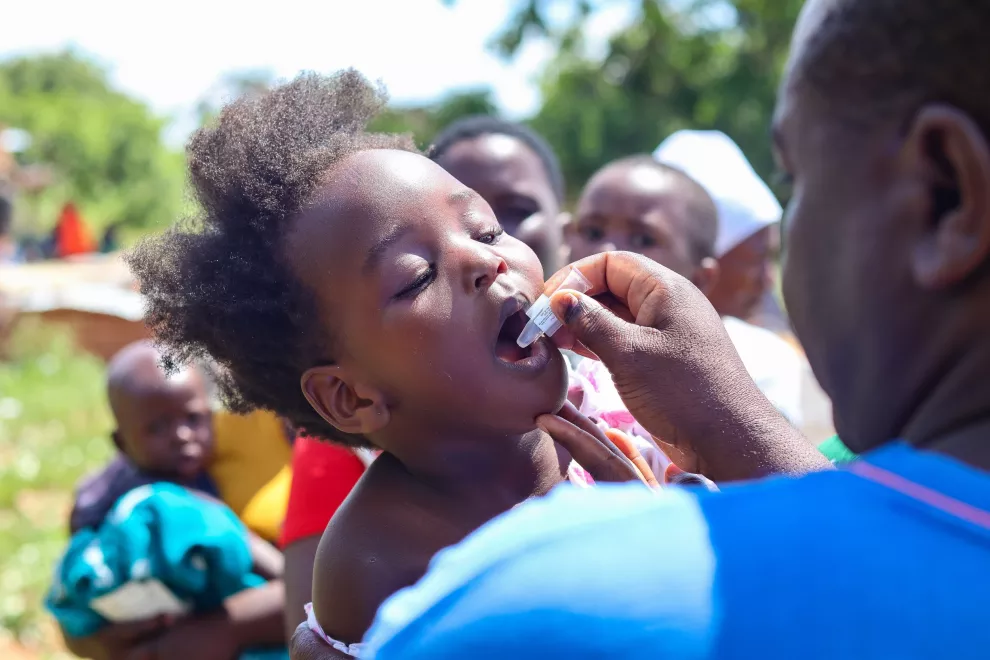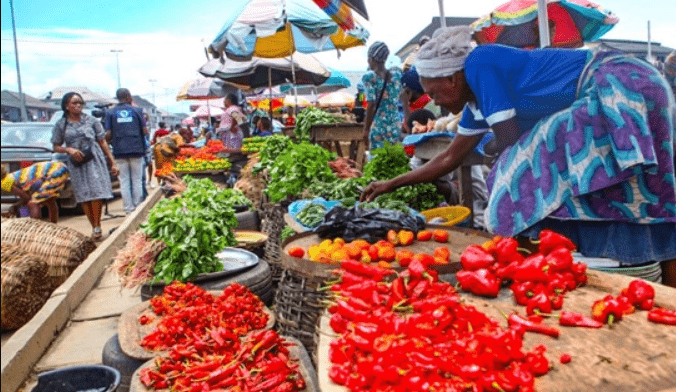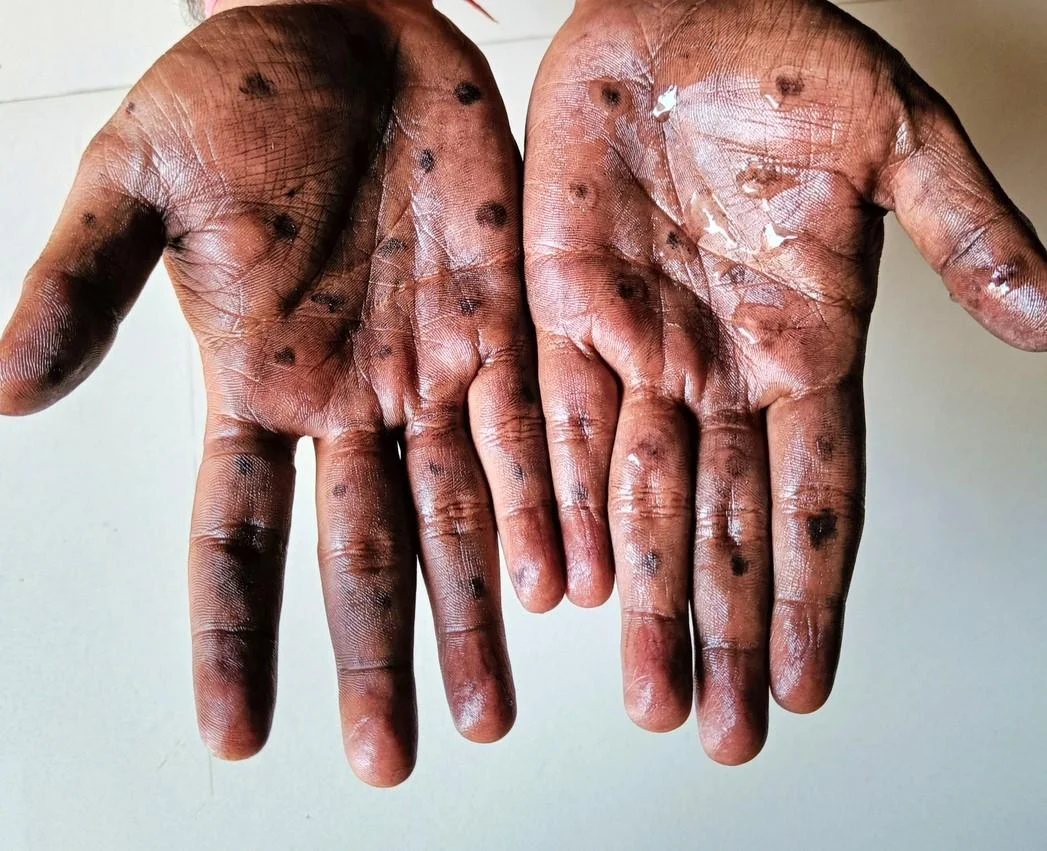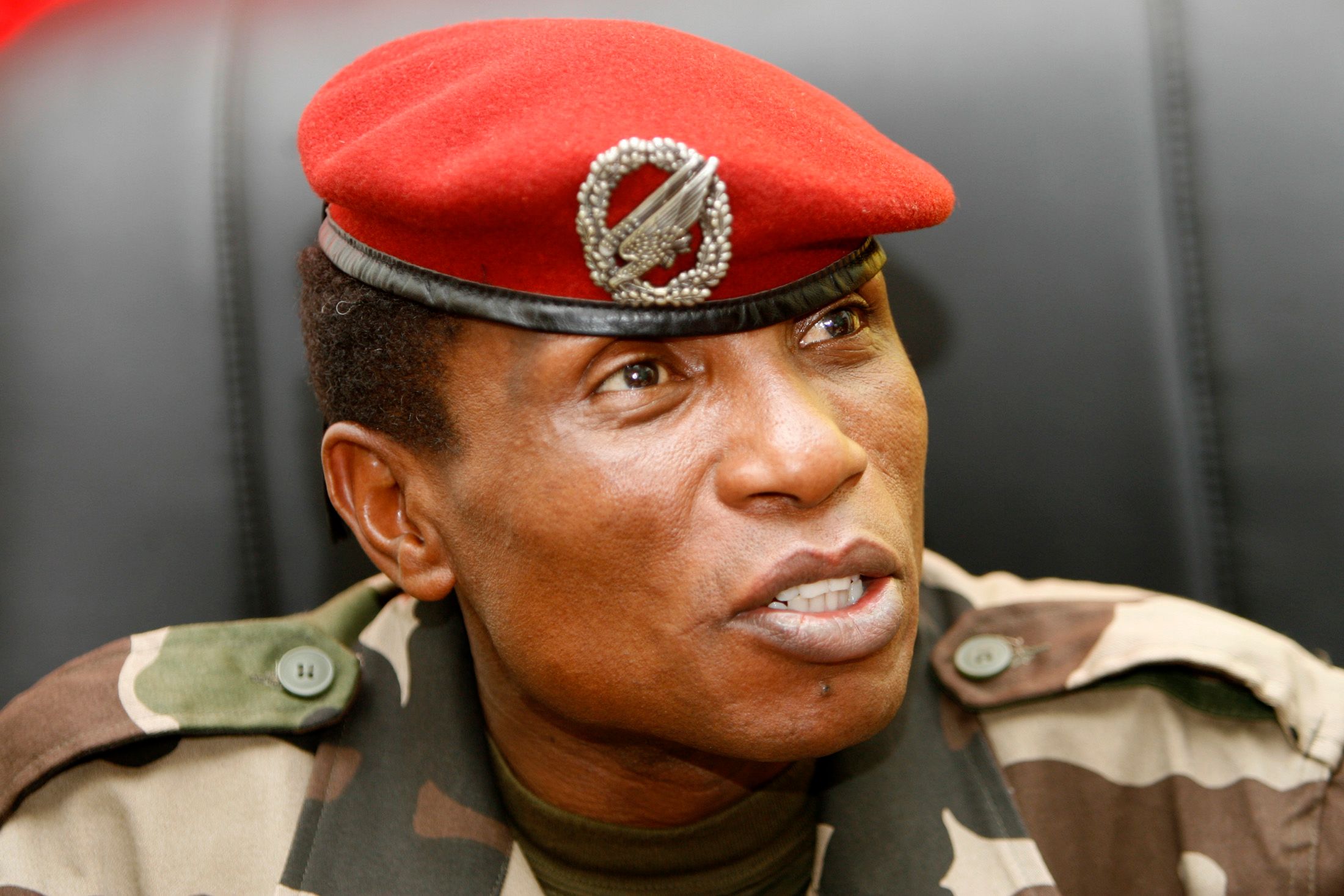Tanzania launches first modern railways built by Turkish firm
Built by Turkish firm at cost of $3.1 billion, 541-kilometer railway runs from Dar es Salaam and Morogoro to capital Dodoma
Nigeria police may seek military help after violent protests
Police in Nigeria have been placed on high alert and may seek military assistance following violent protests in several cities that resulted in at least three deaths, the Inspector General of Police announced. Major cities, including the capital Abuja and Kano in the north, experienced clashes between police and demonstrators, along with looting on Thursday. Despite the early calm on Friday, further protests were anticipated. Inspector General Kayode Egbetokun stated late Thursday that the police were fully mobilized and prepared to respond swiftly to any additional threats to public safety and order. “In light of the current situation, the Nigeria Police Force has placed all units on red alert,” Egbetokun said. “The police are equipped to respond appropriately to the unfolding situation and will seek assistance from other security agencies, including the military, if necessary.” The protests, inspired by youth-led movements in Kenya, have been organized under the banner “#EndBadGovernanceInNigeria” and are set to continue for 10 days. Protesters are reacting to President Bola Tinubu’s economic reforms, which have led to rampant inflation, a weakened currency, and increasing hardship for ordinary Nigerians. President Tinubu acknowledged the pain caused by the reforms but emphasized that they are essential for putting Nigeria’s economy on a path to sustainable growth. Kano, one of Nigeria’s most populous and predominantly Muslim states, imposed a 24-hour curfew after protesters looted a shop and a government complex. Additionally, three other states have implemented curfews in certain areas.
African cities embrace rapid urbanization
A growing focus on developing smart cities in Africa is emerging, aiming to enhance living standards
Curfew imposed in some Nigerian states due to protests
In Nigeria, some states have imposed curfews in response to protests against the removal of fuel subsidies, which has led to rising living costs. The protests, which began yesterday, have escalated into violence in certain areas, prompting curfews in Gombe, Jigawa, Kano, Niger, and Yobe states. Kano Governor Abba Kabir Yusuf stated, “After careful consideration, we decided to impose a curfew to prevent the looting and destruction of businesses and the killing of innocent citizens.” Curfews have also been enforced in Gombe, Jigawa, Niger, and Yobe states due to looting and clashes between protesters and security forces. Civil society organizations plan a 10-day nationwide protest starting August 1, in response to the fuel subsidy removal. Nigerian President Bola Ahmed Tinubu removed fuel subsidies on May 29, 2023, leading to a significant increase in fuel prices. The cost of fuel surged from 185 naira ($0.24) per liter to 620 naira ($0.82).
Kenya court orders extradition of US murder suspect
A court in Kenya on Thursday ordered the extradition of a man accused of murdering his girlfriend in the United States. Kevin Kang’ethe will go on trial in Massachusetts on first degree murder charges for the death of nurse Margaret Mbitu in November 2023. Her body was found with multiple stabs wounds in his SUV in a garage at Boston’s Logan Airport, two days after her family reported her missing. Police say he had boarded a flight from Logan to Kenya the day before Mbitu’s body was discovered. He was tracked down in Kenya three months after the murder and arrested, but escaped in a mini-van just one week into his detention. Kenyan police launched a manhunt and investigation, eventually tracking him down to a relative’s home in Nairobi where he was re-arrested. They also arrested four police officers, two of the suspect’s relatives, and a lawyer who they accused of assisting in the prison break. Prosecutors in Nairobi testified that when Kang’ethe was arrested, he was found in possession of items belonging to Mbitu, including her driver’s license, Bank of America debit card, and a visa card.
Algeria suspends flights to Lebanon amid regional tensions
Algeria’s flag carrier Air Algerie said Thursday that it suspended its flights to and from Lebanon until further notice. The airline urged all customers to contact the company’s call centers for more information and updates. The national carrier did not provide a specific reason for the decision. However, it follows similar moves by other airlines, including Kuwait Airways, Royal Jordanian Airlines, Air France, Lufthansa and Swiss International Air Lines. The suspension comes amid rising tensions and the potential for a broader conflict between Iran and the Lebanese Hezbollah group on one side and Israel on the other. It follows the assassination of senior Hezbollah commander Fuad Shukr by Israel on Tuesday and accusations by the Palestinian group Hamas and Iran that Israel assassinated Ismail Haniyeh, the head of Hamas’s political bureau, in the Iranian capital Tehran on Wednesday. Beirut-Rafic Hariri International Airport, the only airport in Lebanon, has previously been targeted during the country’s civil war from 1975 to 1989 and in past conflicts with Israel, most recently in the July 2006 war. Hamas and Iran have vowed to retaliate for Haniyeh’s assassination, while Hezbollah has pledged to respond to Shukr’s killing. Meanwhile, international efforts are underway to de-escalate the situation and prevent the conflict from spreading further in the region. Fears have grown of a full-blown war between Israel and Hezbollah amid a months-long exchange of cross-border fire. The escalation comes against the backdrop of an Israeli onslaught on Gaza which has killed nearly 39,500 people since last October following an attack by Hamas.
Zambia, Burundi sign 6 bilateral agreements
Zambia and Burundi signed six bilateral agreements Thursday to boost cooperation in various fields, including agriculture and security. The agreements were signed at State House in Lusaka, Zambia’s capital, after the country’s President Hakainde Hichilema and Burundi’s President Evariste Ndayishimiye held official talks. The agreements are in the areas of enhancing commercial cooperation, social welfare and child development systems and agriculture and agriculture research. The two countries will also collaborate in the education sphere under an agreement between the University of Zambia and the University of Burundi, the extradition of fugitives and criminals under a security agreement, and in fisheries and livestock. In a preliminary session of the two leaders’ talks, Hichilema and Ndayishimiye reflected on the ties between their countries, calling for the exploration of more trade and investment opportunities with a spillover effect to the rest of the subregion. Hichilema said he wanted to see better utilization of the Tanganyika Corridor, a link between the Southern African Development Community (SADC) and the Great Lakes region, to enhance trade and connectivity. Hichilema, who also chairs the Common Market for Eastern and Southern Africa (COMESA) Authority, a role he will hand over to Ndayishimiye in Bujumbura this October, also called for enhanced peace, security and stability as a harbinger for development and economic transformation. Ndayishimiye called for increased cooperation between the two countries targeting agriculture and mining, as both countries are rich in natural resources which can be mutually utilized to improve livelihoods. Ndayishimiye is in the southern African nation on a three-day visit at Hichilema’s invitation. He will address the Zambian National Assembly on Friday and grace the country’s 96th Agriculture and Commercial Show on Saturday.
Zimbabwe arrests 18 activists, warns of crackdown
The government has warned of a crackdown on dissent as the country prepares to host a regional summit.
Tuaregs deal devastating blow to Wagner and Mali: 131 soldiers
Tuareg rebels in Mali claim to have inflicted heavy losses on Russian Wagner mercenaries and Malian soldiers during recent clashes.
Togo’s President Gnassingbe keeps Tomegah-Dogbe as PM
President Faure Gnassingbe maintains Victoire Tomegah-Dogbe as Prime Minister in Togo’s new government setup.
Congo rebels reject ceasefire deal amid Angolan efforts
The rejection has heightened tensions in the eastern region of the country.
South Africa sees fewer rhino deaths in first half of 2024
Rhino poaching in South Africa decreased in the first half of 2024, possibly due to a dehorning program, despite an overall increase in the rhino population.
Drop in South Africa’s rhino poaching linked to dehorning initiatives
Poaching remains a significant threat to South Africa’s rhino population, with at least one rhino being killed daily for its horn
Famine declared in Sudan’s north Darfur
Aid restrictions have exacerbated the crisis, putting millions of lives at risk. Urgent action is needed to prevent further loss of life.
Was al-Burhan assassination a false flag operation?
On Tuesday, General Abdel Fattah al-Burhan narrowly escaped an alleged assassination attempt, occurring just one day after his government hinted at a willingness to participate in US-backed ceasefire talks in Switzerland. During a military graduation ceremony on Wednesday, al-Burhan publicly rejected the proposed talks in Geneva and demanded global recognition of his authority over Sudan. His delayed response to US Secretary of State Antony Blinken’s invitation for the peace summit, scheduled for August 14, contrasts with his previous dismissals of international negotiations. The attempted attack reportedly took place in Red Sea State during a military parade and cadet graduation ceremony in Gebeit. Sources indicate that two suicide drones targeted the event, resulting in five fatalities and several injuries, according to a rapid press release from the Sudanese Armed Forces (SAF). This prompt communication is unusual for SAF, known for its typically slower updates in such situations. Following the incident, al-Burhan addressed his supporters with a resolute message, “one army, one people,” and visited the wounded at Gibeit Hospital, also attending the victims’ funeral. The attack has sparked comparisons with recent assassination attempts on high-profile figures, including US presidential candidate Donald Trump, with Sudanese social media users drawing parallels between Burhan and Trump. Speculation and Patterns There is significant speculation about the attack’s origins. Possibilities range from regime hardliners opposed to peace negotiations to potential involvement by the Rapid Support Forces (RSF). Despite this, the RSF’s lack of long-range drone technology makes them an unlikely culprit. However, recent Sudan-Iran relations and Tehran’s support for SAF suggest the possibility of Iranian drones being involved. The RSF would gain little from targeting Burhan, who is widely disliked. This incident follows a pattern of suspicious drone attacks in SAF-controlled regions, which some analysts view as potential “false flag” operations intended to bolster pro-war factions and undermine ceasefire efforts. Political Implications The alleged assassination attempt may politically benefit al-Burhan, potentially addressing criticisms of military inefficiency and justifying crackdowns on perceived opponents. These crackdowns have intensified, with thousands detained on accusations of collaborating with the RSF or opposing the war. The timing of the attack is significant, coinciding with Sudan’s foreign ministry’s request for consultations with the US on ceasefire talks. Despite Burhan’s public rejection of negotiations, his government showed some willingness for dialogue, a stance the RSF had already accepted. US Special Envoy Tom Perriello has been preparing for these talks with backing from the Arab League, IGAD, and the UN. The US State Department has condemned the violence but has not provided extensive comments on the attack. Lack of Visual Evidence As of Wednesday, there is no definitive visual evidence of the drone attack. Available footage shows only panicked reactions and smoke, without clear evidence of the drones, explosions, or casualties.
Police clash with protesters in Nigeria over rising costs
In Lagos, police monitored the protests as demonstrators marched towards government buildings and designated protest sites
Nigerian protesters killed amid nationwide unrest
Nigeria is engulfed in widespread unrest as citizens protest against soaring living costs and government failures, resulting in multiple deaths.
Ashanti and Ewe weave cultural legacy with Kente cloth
Kente cloth, known for its vibrant hues and detailed designs, is a product of skilled craftsmanship
S Africa condemns Haniyeh’s assassination, warns of Middle East turmoil
South Africa’s government condemned the assassination of Hamas political leader Ismail Haniyeh on Thursday, warning that the killing could further destabilize the Middle East. The attack, which occurred in Tehran, is widely believed to have been carried out by Israel, although the Israeli government has not officially commented. South Africa, a vocal critic of Israel’s military actions in Gaza, has likened the plight of Palestinians to that of South Africa’s Black population during apartheid—a comparison that Israel rejects. In a statement, South Africa’s Department of International Relations and Cooperation expressed concern that Haniyeh’s assassination and ongoing attacks on civilians in Gaza would exacerbate regional tensions. The government extended condolences to Haniyeh’s family and called for an investigation into his death. Haniyeh was a key figure in Hamas’s international diplomacy and had been involved in indirect negotiations aimed at reaching a ceasefire in Gaza following Hamas’ attack on Israel on October 7. Following the onset of Israel’s air and ground offensive in Gaza, South Africa’s then-Foreign Minister Naledi Pandor had contacted Haniyeh to discuss humanitarian aid for the Palestinian enclave. South Africa has long supported Palestinian statehood and previously brought a case against Israel at the International Court of Justice, accusing it of genocide over its actions in Gaza—a claim Israel denies. While South Africa’s stance has strained relations with some Western allies, the country insists that its support for Palestinians does not equate to support for Hamas, which is classified as a terrorist organization by many Western countries and is committed to Israel’s destruction. New Foreign Minister Ronald Lamola declared that Haniyeh’s killing violated international law and undermined efforts to achieve peace and stability in the Middle East. He emphasized the need for the perpetrators to be brought to justice.
General Al-Burhan rejects US-backed Sudan peace talks
Al-Burhan vowed to continue fighting until the country is “cleansed” of all rebels and mercenaries
Kenya undertakes mass poisoning to control invasive crows
In a bid to tackle the nuisance created by invasive Indian house crows, authorities in coastal Kenya have initiated a culling operation aimed at eliminating a million of these birds. Unlike the scenario in Alfred Hitchcock’s horror film “The Birds,” this initiative targets the crows, which have caused significant disruptions for decades by preying on wildlife, raiding tourist areas, and attacking poultry farms. The culling, involving the use of poison, has commenced in Watamu and Malindi, with the goal of preventing the crows’ advance toward Nairobi. Known locally as “kunguru” or “kurabu,” these crows originated from India and other parts of Asia, often traveling on trading ships. They were intentionally introduced to East Africa in the 1890s to address a waste problem in Zanzibar. The crows were first recorded in Mombasa in 1947, and their population has since surged due to the abundance of rubbish and lack of natural predators. The Indian house crows are considered one of the world’s most invasive and destructive birds. They have severely impacted biodiversity by preying on indigenous species, including birds, mammals, and reptiles. Conservationists report significant declines in small native bird populations, such as weavers and waxbills, due to the crows’ nest-raiding behavior. Eunice Katana, a farmer in Kilifi county, describes the crows’ behavior as wild and damaging, noting that they attack livestock and defecate on houses. Residents also complain about the birds’ early morning noise and their tendency to dirty tree shades. The poisoning campaign aims to halve the crow population, following consultations with environmental experts, conservationists, community leaders, and the hotel industry. The culling process involves months of pre-baiting, followed by poisoning at gathering sites using Starlicide, an avian poison effective against crows without harming other species. In 2022, tests of the poison killed close to 2,000 crows. Currently, 2kg (4.4lb) of poison is available in Kenya, sufficient to kill about 20,000 crows, with plans to import more from New Zealand. However, the use of poison has raised ethical concerns among animal and bird rights activists, who argue for humane, sustainable alternatives. Despite these concerns, proponents of the culling emphasize the need to protect native species and maintain ecological balance. This culling effort is not Kenya’s first attempt to control invasive bird species; a similar program over 20 years ago had some success before being halted. Now, with the crows spreading inland, authorities are determined to act decisively to prevent further ecological damage.
Cholera death toll in Nigeria rises to 156
The cholera outbreak in Nigeria has now claimed 156 lives, according to the Nigeria Center for Disease Control (NCDC). Between July 15 and 21, the country reported 170 new cases and three deaths. Since January, there have been 4,809 reported cholera cases. In response, medical supplies for case management and infection control have been distributed to health centers nationwide. Nigeria declared a national emergency on June 26 due to the outbreak. Last year, Nigeria recorded over 3,000 cholera cases and more than 100 deaths. Cholera, caused by the bacterium Vibrio cholerae and spread through contaminated food and water, can lead to severe diarrhea and dehydration, which can be fatal if untreated. The country’s challenges with clean water access and medical resources exacerbate the risk of disease. Additionally, Nigeria frequently contends with outbreaks of malaria, polio, typhoid, and monkeypox.
Nigeria plans nationwide protests over economic struggles
Nigerians are planning nationwide protests this week to tackle the worst cost-of-living crisis the country has seen in decades. With strong backing on social media, there are concerns that the demonstrations could mirror the deadly anti-police brutality protests of 2020 or lead to unrest similar to the recent chaotic protests in Nairobi over a tax hike. President Bola Tinubu’s government is working to prevent such outcomes. Local media reported on Tuesday that organizers of the planned protests against rising economic hardships on Thursday have rejected a police proposal to confine the rallies to specific areas. Human Rights Watch criticized the officials’ response, suggesting it reflects a concerning willingness to suppress dissent.
Rwanda leading Africa’s surgical revolution
Rwanda’s IRCAD Africa Advances Surgical Training Across the Continent ICRAD Africa, based in Rwanda, has trained over 300 African surgeons in minimally invasive surgery, addressing the gap between high and low-income countries in high-tech surgical practices, according to a government health official. Inaugurated as the continent’s sole center focused on research and training in minimally invasive surgery, IRCAD Africa aims to enhance Africa’s medical expertise. This modern technique reduces pain and trauma for patients, leading to shorter hospital stays, lower risks of bleeding and infection, and faster recovery times. Many African nations still rely on traditional, more invasive surgical methods, which involve longer recovery periods and more significant patient trauma. IRCAD Africa’s managing director, David Kamanda, emphasized that over 95% of Africa’s population lacks access to advanced medical and surgical procedures, highlighting the center’s role in bridging this gap. Surgeons from 25 African countries and beyond have trained at IRCAD Africa, chosen for its global rankings, safety, and connectivity. Founded in 1994, IRCAD has become a global leader in minimally invasive surgery (MIS) and its application in low- and middle-income countries is expected to reduce surgical mortality in poorly equipped hospitals. Rwandan President Paul Kagame praised IRCAD Africa’s launch, seeing it as a significant investment in public health infrastructure. Dr. Anel Lengton, a South African general surgeon, lauded the center for providing real-time practice on actual tissue, a rare opportunity. Dr. Omeke Joseph Chigozie from Nigeria, training in laparoscopic techniques, praised IRCAD Africa for its potential to produce future medical leaders and impact not just Rwanda and Africa, but the world.
South Sudan faces UN outrage over killings
The United Nations has expressed deep concern over a surge in extrajudicial executions in South Sudan, including the killing of a child by firing squad.
Mpox outbreaks emerge in Kenya and Central African Republic
Mpox is making a comeback in Africa with new outbreaks in Kenya and the Central African Republic.
Dadis Camara sentenced to 20 years in Guinean court verdict
Guinean court has sentenced former dictator Moussa Dadis Camara to 20 years in prison for crimes against humanity in connection to a 2009 political rally massacre.


